Seniors On-Screen: 10 Films That Got It Right & Why We Need More
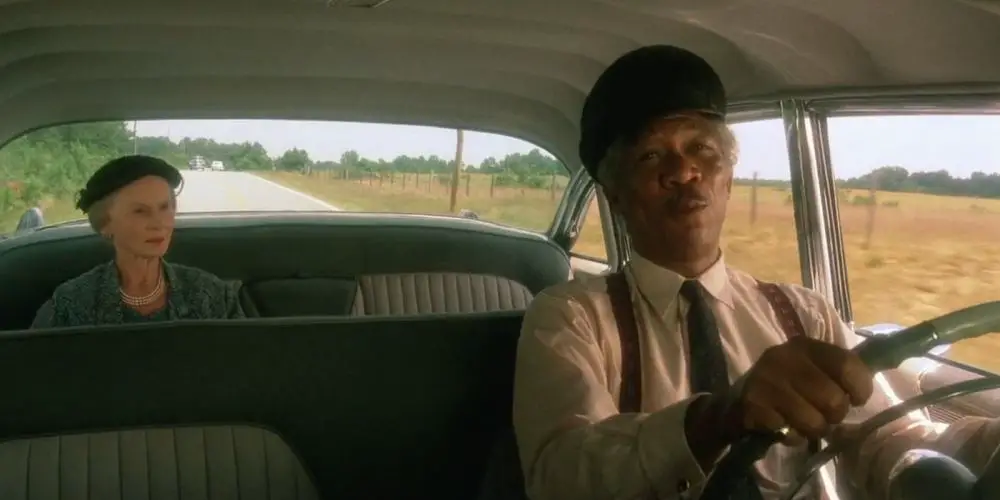
I love film, more than people probably, and I will…
My grandmother loves films, and she’ll watch pretty much anything. To give you an idea, she loved Snakes On A Plane and her favourite film is Deliverance. She also rues the day I took her to see A Scanner Darkly. She’s never been too fixated on films that perfectly represent seniors on screen, but when there is one, you can be damn sure she’s going to see it.
Last autumn I was in an afternoon showing of The Lady In The Van, and it was packed with silver-haired seniors. An audience, in fact, on par with the sizeable one I’d seen on the opening night of Spectre just a few days earlier. The same thing happened again on the release of Dad’s Army. And as the number of films representing, or aimed at, seniors has increased so have the huge afternoon crowds I’ve seen at my local cinema.
In my review of The Lady In The Van I made a plea to the film industry to make more films like it. More films about seniors, more films for seniors. Because of one simple fact, why not? Maybe there was a time when older people weren’t interested in going out, or didn’t have the money or time to. But that seems unlikely. If, in fact, it was ever true, times have certainly changed.
Why Aren’t There More Films About Seniors?
Perhaps there aren’t many films about seniors because there aren’t that many stories to tell about them. How many seniors are working as hitmen? Looking for true love? Stealing from banks? Having children? Well, actually quite a few (except for the thing about hitmen, but you never know). You need only to look around you to see that seniors are living bright and exciting lives.
Their lives haven’t ended. In fact, for some, it’s just beginning. Divorces, widowing, retirement, redundancy, loss of friends and loved ones, all these factors mean that for many of them their lives are changing as constantly as ours. What is more, in our contemporary society, they have more time and more money than any of us youngsters in which to go and do things. One of those things being going to the cinema.
[easy-tweet tweet=”Divorces, retirement, loss of loved ones; their lives are changing as constantly as ours.” user=”FilmInquiry” usehashtags=”no” template=”light”]Maybe the lack of films about seniors is about a more depressing fact. Perhaps it’s a simple as that, like in most other careers, older actors and actresses just aren’t considered. They’re not seen as important and not seen as a draw, so no one makes the effort to form film productions around them. You just have to look at the oldest winners of the Best Acting Oscars to see that after their very early sixties the generation all but disappears.
But then, the film industry has maybe learnt its own lesson as of late. At least in Britain, what with films starring Maggie Smith, Judi Dench and Helen Mirren winning awards as well as succeeding at the box office.
What’s Your Type?
I know what you’re thinking, there are a lot of films with seniors in them, and you would be right. That is if all you want is another a stereotype, or the same story, or a sad story, all told with the same small supporting roles. The wacky senior is always good for a few laughs, we saw that in The Lady In The Van, Little Miss Sunshine and Love Actually. Or the ‘crazy’ senior, seen in Sunset Boulevard and What Ever Happened To Baby Jane?.
The dying senior teaches us important lessons about life, in Tuesdays With Morrie, Harold and Maude, and My Afternoons With Margueritte. Dementia, now being discussed in the mainstream media, has become quite popular as a narrative, with Iris, The Notebook, Away From Her, Amour, Robot and Frank and more, being made.
The newest type to work its way through, as older actors have aged presentably well for the romantic screen, is the love story. With films such as Mr Morgan’s Last Love, Le Week-End, 45 Years and more besides, all dipping their toe in the water. Even when films attempt to be realistic and truthful it always comes down to the same type, that of the belligerent parent and their long suffering child (Grandma, Nebraska).
Occasionally we have stories where great importance is placed on senior characters, this is especially prevalent in the royal biopic with films such as Mrs Brown, The Madness Of King George or The Queen. Though even then the usual types find their way in; dying, ‘crazy’, guilty? Guilt is also an often used stereotype in these senior stories. Guilt, depression, illness, or death, those are your choices as a senior protagonist on the silver screen. Not to say that none of these films deserve to be watched or receive such accolades, but they all wind up conforming to the same types.
So my question, in regards to all this, is: who would want to see a film where their projected self is always so miserable? Maybe none of us, but then this is the only choice most seniors have. Except in a few special cases. Sometimes seniors are treated like human beings; important, complex and unique. Living lives that, while exaggerated for the cinema screen, are inspiring, engaging, and incredible to watch.
10. The Lady In The Van (2015, Nicholas Hytner)
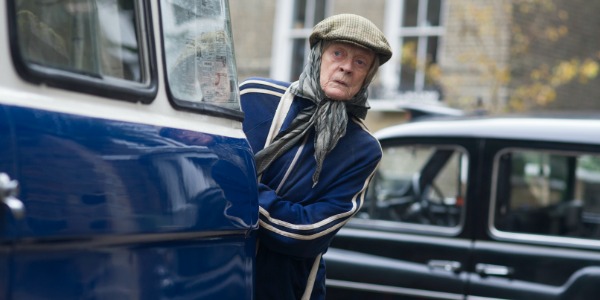
Although drawing on the ‘crazy old lady’ stereotype mentioned above, because The Lady In The Van is based on a true story it delves further into its character, sympathetically revealing her complexities. Based on Alan Bennett’s book and play of the same name The Lady In The Van is about Miss Shepherd, the lady who lived in her van, on his driveway, for over 15 years. While insular and brash Miss Shepherd is also intelligent and creative, although a lifetime of trauma and anxiety has led her to cut herself off from society.
Miss Shepherd is an uncontrollable, inspiring woman and while she is critiqued by Bennett, she actually supersedes him in importance. Making The Lady In The Van one of the rare cases where a film’s entire entertainment value is based on a senior character, and one played remarkably well, by the ever impressive Maggie Smith. While it only cost $6 million to make the film raked in a staggering $40 million in a the global box office, standing as proof of the appeal of the senior protagonist and the importance of films of this nature.
9. Driving Miss Daisy (1989, Bruce Beresford)
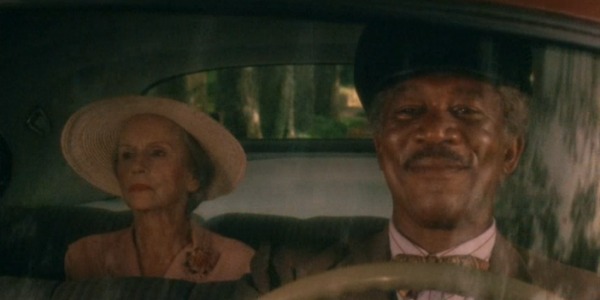
It can be no surprise that Driving Miss Daisy, which provided the oldest winner of the Best Actress Oscar (with Jessica Tandy picking up the award at the age of 80), has made it on to this list. Based on the Pulitzer prize-winning stage play of the same name the film tells the story of Daisy Werthan (played by Tandy) and her relationship with her driver Hoke Colburn (played by Morgan Freeman).
Set in the 1950’s, in Atlanta, Georgia, the film centres around the friendship that develops between the two, in spite of the prevailing attitude towards Hoke’s race. Celebrating the patience and love that Hoke shows Daisy in spite of her original objections to him.
Driving Miss Daisy is parodied often, but then they say that referencing a work of fiction is the sincerest form of respect. That being said so many people have yet to see this wonderful film. It’s a quiet sort of film, and like many of those on our list probably does not appeal to the ‘youth of today’, but its emotional silences speak volumes. This is a film all about the importance of patience and kindness; there are scenes between Hoke and Daisy that will just swell your heart.
But it’s also a film that tells us that it doesn’t matter how old, stubborn, or set in your ways we might be, friendships can still be created and in the end they will ensure that we will never stop living our lives to their fullest.
8. Love Is Strange (2014, Ira Sachs)
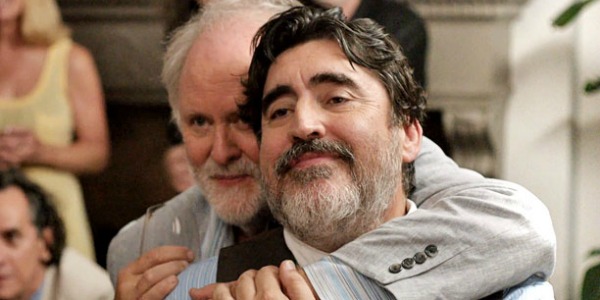
Love Is Strange tells the tale of newlyweds Ben (John Lithgow) and George (Alfred Molina). After an eternity living together as ‘partners’ they are, thanks to the change in law, finally allowed to marry. But after George loses his job, they are forced to give up their apartment and live separately while they search for a new one. Not only is Love Is Strange a striking and realistic portrayal of how meaningful the gay marriage bill is to couples who have shared their lives, it is also a touching examination of what living in a long term relationship really means.
Ben and George are set in their ways, but happily so. They know what they like, and they know what time they like it. While the film doesn’t delve into the minutiae the way it could have, it does show the awkwardness and unhappiness that goes with being separated from a partner. You miss the time you eat together, when you sleep together, how you dovetail into each other’s space and moods.
It’s an endearing portrayal of a real understanding and affection between two seniors, and should be lauded for it.
7. Up (2009, Pete Doctor & Bob Peterson)

The opening of the film Up is one of the most honest to goodness heartbreaking things you will ever see in cinema. Because not only is it sad, it regales us with a sadness we know we will all one day be party to, which only makes it worse.
Up is about what happens when you’re ‘old’, alone, and are left with literally nothing to live for. Carl Frederickson is a mean and miserly man, or so it would seem. What he actually is, is bitterly unhappy after losing the love of his life. In one hugely uncharacteristic, rebellious act he takes to the sky to pursue a dream he was always too afraid to take.
Up, by its very nature, is a hugely uplifting film. It takes the stereotype of the grumpy old man, and the Ebenezer Scrooge tale of redemption, and lights a flame under them. Carl doesn’t just become a nicer person, he reaches into himself to resurrect the confidence and bravery he once had, and importantly he learns to live a life without his wife Ellie.
While it is overwhelmingly heartbreaking about the truth of old age it also helps to recognise the very real complex people seniors are. It’s easy to overlook in the light of its fantastical nature, but Carl is an adventurer. He was born in a time when real adventurers still existed, and travel was still something to be marvelled it. Because of this he is, in effect, the most honest representation of an adventurer. We would all do well to remember that, and I’m sure Ranulph Fiennes would agree.
6. Venus (2006, Roger Michell)

Written by the award winning Hanif Kureishi, Venus tells the tale of two actors, Maurice and Ian. Once successful they now fill their time with not much at all, until Ian (played by Leslie Phillips) invites his great-niece Jessie (Jodie Whittaker) to stay. Jessie up ends their quiet but mundane routine and Maurice (Peter O’Toole) develops an obsessive crush on her. Venus is a simple film, but quite brilliant, because it takes the time to consider the mind-set of the older man.
Peter O’Toole was known to be something of a scoundrel in his day; he and director Roger Michell squeeze every element of this rebellious side from him, forcing you to recognise Maurice not as a ‘dirty old man’ but simply a man. One who appreciates beauty, still thinks about sex, and who is unapologetic about it.
You could say that Maurice is a sexual deviant but it’s about much more than that. Venus is about the passionate sexuality that continues to exist long after your body has aged, and that matures inexorably, even long after society has told you that you’re not allowed to think such thoughts. Plus, it has damn good fun rubbing your face right in it.
5. Tea With Mussolini (1999, Franco Zeffirelli)
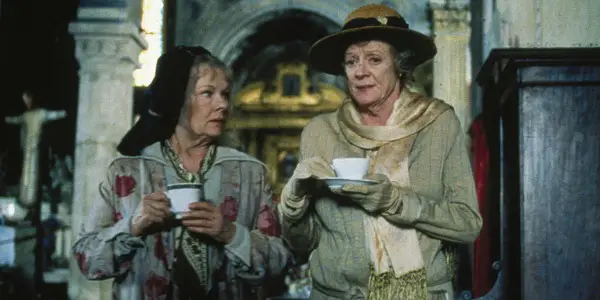
Touted as a film ‘starring Cher‘ on its release, Tea With Mussolini is a semi-autobiographical film from Franco Zeffirelli is not only one of the greatest gatherings of British talent but an achievement in the representation of senior women. Set in a pre-WWII fascist Italy a group of older women are forced from their easy, decadent lives into a small house where they must protect the young men in their charge, stand up for Italy and its art, but most importantly, stand up for the decency and respect they feel they deserve.
While even now Cher gets top billing on IMDb, the film’s main protagonist is played by Joan Plowright, with support from Judi Dench and Lily Tomlin. However, the film is well and truly stolen by Maggie Smith as Lady Hester Random. Hester is hard and brash, she knows how to stand up for herself, yet she does have a caring side, seen in her protection of her grandson Wilfred.
As Smith is wont to do, she of course won a BAFTA for this performance, and with good reason. Tea With Mussolini is an exciting and energising take on the stereotype of the grumpy old lady, and is a pure delight to watch.
4. Youth (2015, Paolo Sorrentino)

Youth is a superb film. It is beautifully made, both in its visuals and in its magnificent soundtrack. More than this it is a fresh take on what it means to be young. Fred (played by Michael Caine) and Mick (Harvey Keitel) are old friends, and while they may discuss the problems of getting older their main aim is to enjoy themselves, and their time together.
While Fred is physically fit but apathetic, Mick is accumulating health problems, but is full of energy for the work he does. The lives and thoughts they live so clearly are cast in sharp comparison to the confusion of Fred’s daughter Lena (Rachel Weisz), actor friend Jimmy (Paul Dano), and indeed the rest of the Swiss resort where they are staying.
Youth is a film all about what it means to be young. Youth is held up as this wonderful, pure thing, even the film itself is directed at the enthusiasm and vivacity of the young. But as this film shows, youth is not really about age, it is about energy, the fight for self-awareness, clarity and an understanding of the world. Which conversely you only achieve with the passing of time.
What makes Youth such an incredible film is that it is not about the old versus the young, it is about the confused and the narrow-minded, versus the wise and brave. For that it is a most remarkable film indeed.
3. The Mother (2003, Roger Michell)
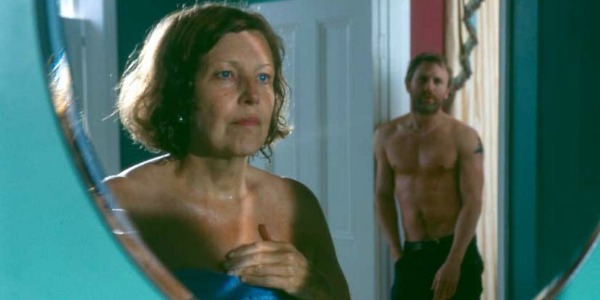
It is probably unsurprising that the team of writer Hanif Kureishi and director Roger Michell were impacting on the cinematic representation of seniors even before Venus. For The Mother in 2003, they paired a 67 year old Anne Reid with a pre-Bond 34-year-old Daniel Craig. The film went on to garner a reputation as Craig’s first real film role (unless you include Tomb Raider) and recognition for its May to December romantic relationship. Overlooking the sensational representation of a senior woman on screen.
The Mother is about May (Reid). Recently widowed, she is staying with her daughter Paula and her family. Of course tensions spring to the surface, least of all because of Paula’s affair with Darren (played by Craig), a builder working on the family’s home. As hostilities grow so a sexual relationship begins between May and Darren.
What’s especially striking about The Mother is that it doesn’t live up to type. May doesn’t get along with her daughters, and although she often shows unendearing devotion to Darren she is not attached to him or her family. The film’s denouement is spectacular and demonstrates May’s independence and lack of allegiance to being the emotional, devoted mother cinema expects her to be.
2. All Is Lost (2013, J.C. Chandor)
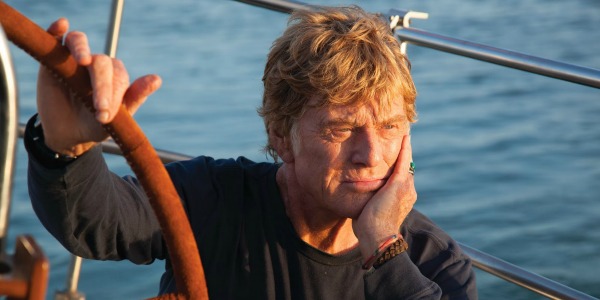
All Is Lost was released around Christmas 2013 to little fanfare. While the critics got behind it, it was hard to encourage an audience to see a film which featured only one actor, and an ‘old’ one at that. What a mistake that was.
All Is Lost is a superb film. A lone sailor damages his boat, then problem after problem mounts until he’s left to face the very real prospect of losing his life. Not only does the film excel in respecting its audience and the art of filmmaking, by dwelling closely on the physical details of survival, but it succeeds in one of the most positive and astounding representations of a senior.
Robert Redford would have been around 76 when the film was made. His and director J.C. Chandor’s unflinching resolve to push him both physically and as an actor is amazing, and surpasses most of what younger actors are capable of doing or are willing to commit themselves to. All Is Lost stands as a milestone in cinema’s representation of what it means to be old and what it means to be a true adventurer and fighter.
It is also possibly one of Redford’s greatest performances, and a credit to the acting disciplines he and his peers still attest to.
1. The Best Exotic Marigold Hotel & The Second Best Exotic Marigold Hotel (2011; 2015, John Madden)
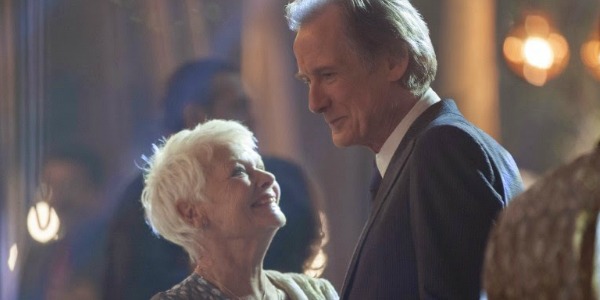
While other films on this list may appear more astounding or entertaining, The Best Exotic Marigold Hotel and its sequel find its way to the top of this list because for me, more than any others, they are what are closest to home. The characters are authentic and the narrative realistic. The films centre around a group of retirees who make their way to an Indian hotel in their search for care, closure, and ultimately a change in their lives.
Our society is to keen to overlook the life of the senior, especially the retired one. No longer of any ‘use’, they are ignored and their value invisible. Based on Deborah Moggach’s book, these films looks closely at what it means to be a senior, and what it means to live a life after retirement age. The characters in The Best Exotic Marigold Hotel are rich, imaginative, and curious. While the original sets the stage it is the sequel that really opens up the possibilities.
Evelyn (played by Judi Dench) is faced with the prospect of a career she no longer thought she was allowed to pursue, Douglas (Bill Nighy) sees the freedom and excitement available to him away from his dominant wife, and Muriel (Maggie Smith) sees that great wisdom can come from embracing life again.
They, and more characters besides, are delivered up from the stereotypes that stalk the senior on screen. They are the seniors I recognise, the bold, imaginative people whose lives are still going on. Regardless of what our society might assume.
Conclusion
What all these films share is a recognition of seniors as independent, sexual and adventurous people. But so few films regard them this way, to create this list I can tell you was no easy task. The senior is so rarely rendered as a complex character. No one imagines that their parents and grandparents are off doing things without them, they certainly don’t want to think about them having sex, and they can’t even begin to think that their elders might have dreams and aspirations to.
Why is that? Why do we like to assume that we are the driving forces behind society, and our parents and our grandparents’ lives are over? Are we so selfish that we think we are the youthful sun that they orbit? Maybe our dislike for this age group stems from our awareness that society does not respect them, and instead of acknowledging this and changing it, we refuse to discuss it.
Instead we treat our elders as faded versions of ourselves. This will come back to bite us in the end, because we will one day be their age and if we want respect then we have to start respecting them now, and undo this vicious cycle.
This lack of consideration and respect we have for seniors is all too apparent on our cinema screen. While the tide is turning (many of the films listed above are very recent), it’s not moving fast enough. Not to long ago 60 became the new, powerful age, 70 followed, soon 80 and 90 will too. The older age group are now living without mortgages and bills, free from the health problems we will encounter because of their sturdy pre-21st century diets. They don’t even need to use technology to work things out, so they’re probably smarter than we are, too.
[bctt tweet=”‘They’re in the cinema, propping up the box office, while we’re slaving away in our offices.'” username=”FilmInquiry”]The seniors are out there right now, with more money than us. They grew up in a time when travel meant real adventure and so many of them are exploring parts of the world we couldn’t even point to on a map. In between these holidays and daytrips they’re in the cinema, propping up the box office while we’re still slaving away in our offices.
Between the senior audiences and actors (a little older and more experienced, now winning the awards), we have a lot to thank this older generation for. So isn’t about time that we recognise them, listen to them, and give them the attention they deserve on the cinema screen?
Honourable Mentions: A Walk In The Woods, Beginners, Cocoon, Grandma, Harry Brown, Hot Fuzz, Limelight, Ladies In Lavender, Last Chance Harvey, On Golden Pond, Quartet, Red, The Straight Story. Also Roald Dahl’s Esio Trot. While a TV movie, I feel it’s worth mentioning for its brilliant and beautiful portrayal of a romantic relationship between seniors.
Can you name a character or film which really shows what it’s like to be a senior?
Does content like this matter to you?
Become a Member and support film journalism. Unlock access to all of Film Inquiry`s great articles. Join a community of like-minded readers who are passionate about cinema - get access to our private members Network, give back to independent filmmakers, and more.
I love film, more than people probably, and I will watch pretty much anything. Seriously, anything! I have a postgraduate education in film & have spent an exceptionally long time trying to get inside the film industry. I'm a big believer in treating every film the same, and bringing something new to the film theory table, giving reasons for every argument made. You'll find that I'm an empathetic and fun sort of reviewer, at least, I like to think so. If I'm not watching films I'm doing exceptionally nerdy stuff, like watching documentaries about the history of medicine and collecting photos of old post boxes.













